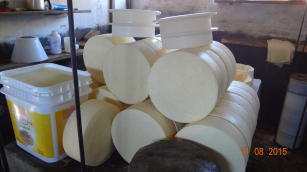Characterization of artisanal cheese produced in municipalities within the Green Corridor Mantiqueira - generating income to family farmers and safe food for consumers
Characterization of artisanal cheese produced in municipalities within the Green Corridor Mantiqueira - generating income to family farmers and safe food for consumers

Photo: VICENTINI, Nívea Maria
The artisanal cheese production stands out as an important activity for income generation of family farmers in different regions of the country, such as the Coalho Cheese produced in the Northeast, the Colonial Cheese in the South and, more specifically, the Minas Artesanais cheese types, such as Canastra and Serro, produced in the State of Minas Gerais. However, among the main obstacles related to production and marketing in the formal market, stands the possibility (or not) to reconcile legal requirements to that particular type of food production. One of the main points of this conflict concerns the microbiological quality of raw material (milk), in view of the use of raw milk (not pasteurized) in many cases. In addition to this fact related to the safety of the end product, little is known about the microbiological factors and milk composition that confer proper characteristics to cheese produced in certain locations. In other words, besides pathogenic microorganisms that may be present in milk, putting the safety of the final product at risk, it is also important to identify the microorganisms that give specific organoleptic and sensory characteristics to the product. Whereas artisanal cheese production in many regions of the country is essential to generating income for family farms and that the main barriers to the marketing of this product are related to food safety and the lack of knowledge on cheese manufacturing procedures, this project aims to characterize the artisanal cheese produced in municipalities in the Ecological Corridor of Mantiqueira, as well as the production systems adopted by family farmers and the physicochemical and microbiological characteristics of the produced milk and cheese. Our hypothesis is that the production system adopted in the region, the milk produced and the local know-how provide the conditions for the production of a differentiated artisanal cheese, which could be targeted for future actions for the identification of origin of the product. The set of variables studied and the combination of these variables will allow establishing the identity of artisan cheese. In addition, the microbiological and cheese composition evaluation during the ripening period is also an important scientific contribution to the understanding of this process. Using participatory methodologies 50 properties located in the municipalities of Alagoa, Bocaina de Minas and Carvalhos were selected. In these units, it is being conducted a survey of information that will provide support for a detailed description of the milk production system and manufacturing of cheese of the region. Concomitantly, soil, water and raw milk samples are being collected in order to determine the physical and chemical characteristics (soil and water), SSC (somatic cell count), TBC (total bacterial count) and composition (milk), and microbiological analyses (water). Among the 50 studied properties 10 were selected as representative of the local production systems, towards complementary physical-chemical and microbiological analyses in samples of raw milk, yeast, brine and cheese. During the conduction of the project there will be training courses in Good Practices of milk production and cheese manufacturing, taking into account the local know-how. The return of the characterization of such milk and cheese production systems to local farmers, as well as the evaluation of the quality of the product combined with the training in good practices will indicate the strengths and weaknesses of their production processes enabling decision making on changes to be implemented, with a focus in know how to do. The methodological process adopted in this project could support the Ministry of Agriculture, Livestock and Supply and other government agencies in establishing public policies related to guidelines for the certification and / or granting of geographical indication for artisanal cheese in other regions of the country.
Ecosystem: Atlantic Forest
Status: Completed Start date: Sun Feb 01 00:00:00 GMT-03:00 2015 Conclusion date: Thu Jan 31 00:00:00 GMT-03:00 2019
Head Unit: Embrapa Dairy Cattle
Project leader: Maria de Fatima Avila Pires
Contact: maria.pires@embrapa.br
